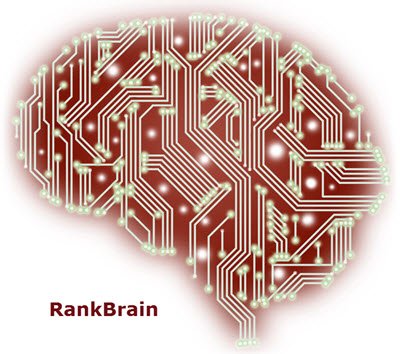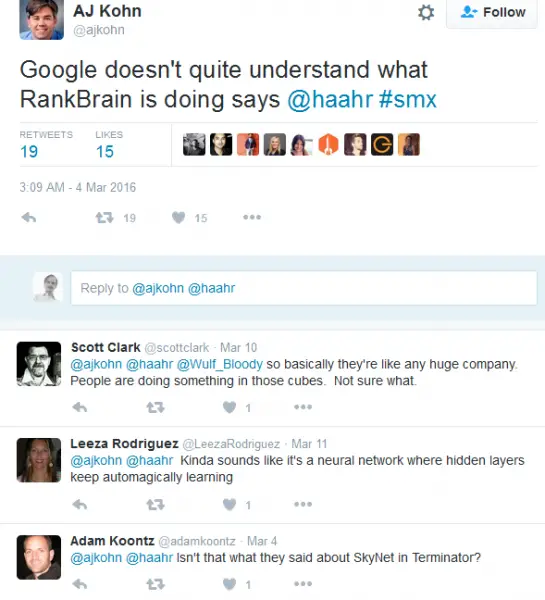What is the Google RankBrain algorithm update all about & how does it work? How does this machine learning Artificial Intelligence (AI) affect SEO? In my previous article on facts and myths of Artificial Intelligence, I wrote about Strong AI and Super AI. I said that they may take time before they arrive; that it’s just a matter of time before someone cracks how to make a machine think like humans. I also said corporates would be glad to fund such projects if they promise better profits. For one, Google now has a “brain” that works well and it is called Google RankBrain. It may not be able to think yet but who knows the future! What surprised me was a comment from a Google executive saying they can’t understand what Google RankBrain AI is doing.

What is Google RankBrain AI
AI stands for Artificial Intelligence, and I will be using the acronym here to keep it easy. Before proceeding to the part where we will talk about Google not being able to understand what its own creation is doing, this section introduces BrainRank AI Search to readers who don’t know about search engine algorithms.
Search Engines like Google depend on hundreds of factors to bring the best possible results to anything you enter in the search box. Earlier they were dumb and focused just on keywords. But the keywords could also be dumb. For example, people can search for “explain top of the food chain”. This can easily confuse a search engine into assuming that maybe the person searching is asking something about food chains like restaurants so give him a list of top restaurants in the area
But the person is actually searching for the name of which, the top carnivore. The food chain starts with single cell animals, goes on to herbs, then herbivorous animals, carnivorous animals, humans and ends with a predator on the top.
Google and other search engines store plenty of information on their servers so that they can provide you with the results you want. For that, they check out many factors. So far, no artificial intelligence was involved. Among the hundreds of factors, it was ‘items in bold’, ‘headings’, ‘subheadings’, ‘repetition of a word or phrase’ and many such things.
If the person who is searching on Google, types in irrelevant things into the search box, the results were always garbage. The first principle of machines is if you feed garbage to machines, they’ll give out the garbage. You may search GIGO (garbage in, garbage out) for examples of this principle.
To tackle such situations, Google kept on making changes to its search algorithms and then secretly included BrainRank into it somewhere in 2015. It kept it a secret until recently. An event was held in March, and that is when they acknowledged that their engineers do not know how the thing works. It does send out wrong signals.
RankBrain is part of Google’s Hummingbird search algorithm, and is said to be the third-most important signal – the first probably being the quality of back-links. It will soon change the way SEO works.
Here is what Google RankBrain AI search algorithm does according to what I could grasp from my research. Instead of focusing on each search initiated, it focusses on the entire search session. Normally, to get proper results and to narrow down, many researchers use synonyms and words related to what they are searching. Like in the above example, one may use “topmost consumer in the food chain” and “what’s the highest level of food chain called”. He or she may use more keywords depending upon what the person wants to know.
So as the searches progress in the session, from the first search to nth search, Google RankBrain AI will start presenting more and more relevant pages to the researcher. This may include pages that do not even include the keyword but provides more related information about the same.
How does Google RankBrain work
Here comes the problem. The creators of the RankBrain AI themselves do not understand how it works. Since it is limited to search, it is not a scary situation. But imagine creating a similar thing in a domain that is related to weapons? What are the odds against a machine growing mature enough to take its own stand against the creators? What if we create AI-based robots for the army, mass produce them and some things go wrong to make them turn against their own generals? It doesn’t look right. The chances are 50:50 – a good amount of risk.
In an event called SMX, Google’s Paul Haahr, who goes by the handle @haahr on Twitter told many interesting things about the algorithm and acknowledged that Google engineers who work on RankBrain don’t know how it works. Either Haahr was not willing to share information or the creators really don’t know much about their creation.
If later is the case, it should ring some alarm bells. Already many scholars have raised their fears on AI and the fast growing research in the domain. They petitioned governments to stop funding projects leading to strong and super AI.
Google RankBrain AI is just the beginning!
